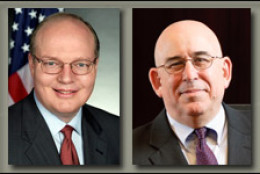Cybersecurity
-
A new agreement, called the U.S.-Brazil Defense Cooperation Dialogue, is aimed at bringing both countries closer military-wise.
April 10, 2012 -
Tech America and USTelecom said the Anonymous hacker group targeted their Internet sites in denial-of-service attacks.
April 10, 2012 -
Host Mark Amtower talks about the big contracting issues with Northrup Grumman's Ed Swallow and Dan Mintz from PowerTek Corporation. April 9, 2012(Encore presentation April 23, 2012)
April 09, 2012 -
Hackers from the group Anonymous claim to have broken into Chinese government computers, with the ultimate objective to take down the country's firewall.
April 09, 2012 -
Microsoft has found several critical security risks in its Office and Internet programs that may leave people open to hackers this tax season. The biggest problem is in Internet Explorer software, because every single version of the program is at risk, the company said.
April 09, 2012 -
The inspector general's office at the Department of Veterans Affairs said it found more than $15,000 security holes at the agency, all dealing with FISMA compliance issues.
April 09, 2012 -
A computer virus has infected more than 600,000 Apple computer, alarming IT security professionals, who are unaccustomed to seeing a Mac attack.
April 06, 2012 -
Charles De Sanno from the Department of Veterans Affairs and Booz Allen Hamilton's Ilene Yarnoff will talk about mobile apps and mobile security issues in the federal workplace. April 6, 2012
April 06, 2012 -
The experts said too many chief information security officers have a compliance mentality. It's more important to understand the organization's mission and focus on protecting its most important data.
April 06, 2012 -
The FBI's Criminal Justice Information Services says local law enforcement needs to encrypt its data if it wants to join the cloud. The FBI said when information is encrypted from the start, police can have control of its cybersecurity on any cloud system, according to a post on InfoSecurity.
April 05, 2012 -
Several advocacy groups have raised major civil-liberties concerns about pending cybersecurity legislation, claiming the language may unfairly expose personal information and punish those who hide it.
April 05, 2012 -
Microsoft received 20 submissions in a contest to come up with new security technologies. The company's Blue Hat Prize will pay the winner $200,000.
April 05, 2012 -
A federal utility powering a third of the Pacific Northwest is vulnerable to computer breaches. An Energy Department audit found the Bonneville Power Administration, which services hospitals, banks, and critical military installations accounts for 30 percent of the region's power.
April 04, 2012 -
While Congress debates several new cybersecurity bills, a Congressional Research Service reports shows the government is already involved in regulating cybersecurity.
April 04, 2012 -
Jim Harper, senior policy analyst at the conservative Cato Institute, says that some of the cybersecurity bills Congress is considering are overreaching and may be unnecessary in the long run.
April 04, 2012



